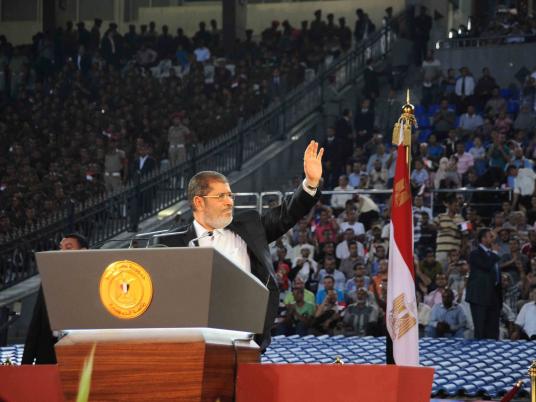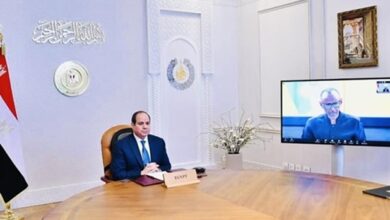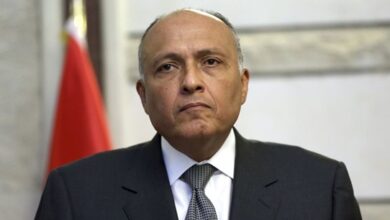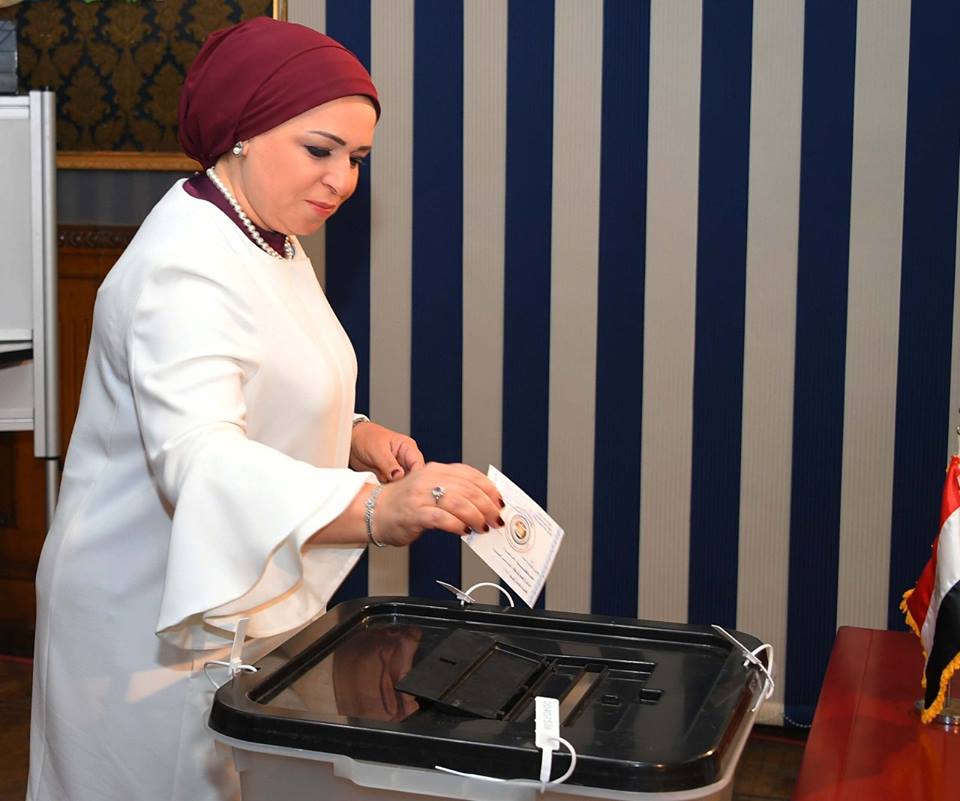
Sporting a smart casual outfit and riding in a convertible, President Mohamed Morsy greeted the audience gathered at the Cairo Stadium to attend the 39-year anniversary of the 1973 October war.
Some 50,000 people were seated in the stadium, several of them waving Muslim Brotherhood flags.
Amid the enthusiastic applause, and after an introduction on the war and its martyrs, Morsy moved to the discussion of his promises concerning the first 100 days of his presidency.
“I previously spoke about our need to solve the serious problems in the 100 days I talked about, and I tell you clearly that I am fully responsible for the 100 days and what happens after that,” he said.
After his first 100 days as president, Morsy gave an account of the results of his work from when he assumed power on 30 June to the beginning of this week. Everything Morsy said sounded positive, and suggested he and his government were on the right path — while official data released by the Cabinet’s Information and Decision Support Center suggests the plan might be off track.
The center’s report evaluates Morsy’s first 60 days in power, including the first month after the Qandil Cabinet was formed. The data shows procedures adopted during that period brought about mixed results at the time they were compiled.
Morsy says he has achieved 60 percent of his promises related to traffic, 70 percent for security, 75 percent for fuel, 80 percent for bread, but only 40 percent for hygiene.
Meanwhile, the independent Morsimeter website — set up to monitor the president’s performance — says he has completed only four of his 64 goals.
Mahmoud Emara, a political economist, says Morsy’s claims of success have proved difficult to verify.
“The 100-day plan is not linked to long-term economic goals to overhaul the service and economic sectors in Egypt, and the president has not explained what criteria he has used to measure the results,” Emara explains.
Street politics
Even though Morsy peppered his speech with slang, apparently an effort to show the people that he understands their problems, many still complain that the president is out of touch with the troubles they face.
Abdallah Mahmoud, a clothing seller in downtown Cairo, says the issues Morsy has pledged to tackle are more neglected than before — particularly security, which has deteriorated in low-income neighborhoods, where violence and crime are mounting.
“There is no security. The police cannot be present in areas and at the same time be completely absent from other locations that might be in greater need of a stronger security grip,” he says.
In his speech, Morsy said security campaigns have led to the arrest of 500 gangs and 1,542 suspects, the removal of 8,200 illegal encroachments on state-owned land, and the restoration of 6,600 stolen cars.
Meanwhile, the Information and Decision Support Center report says 64 percent of citizens have not seen any mobile or stationary police patrols, and that 80 percent did not see the police cooperating with popular committees.
However, Mostafa al-Bazz, Daqahlia security chief, says the police’s priority during the past 100 days was to deploy police in areas such as Mariotiya, Port Said and Manzala, which have rather unstable security environments.
“The security situation cannot be fixed in 100 days, but we aspire to a lower crime rate and fewer clashes,” he says.
The report states that 57 percent of citizens saw no change in traffic jams, while 38 percent thought the situation had improved. The president claimed that 60 percent of targets in this field have been met.
Samir Saeed, a koshary seller in Heliopolis, says his daily traffic struggle is “humiliating,” particularly with the recurrent labor protests since Morsy rose to power.
“The strikes, which workers stage to call for higher salaries, slow down traffic. The 100-day plan was expected to fail because Morsy has failed to address those demands for better pay,” Saeed says.
Egyptians hope to see the bread crisis, which has persisted since 2008, solved. Many complain about the long lines in which they have to wait to get the subsidized bread priced at LE.05, as well as about the quality of the bread and the wheat used to bake it.
Subsidized bread is not always available because of demand exceeding supply. Random samples of bread have shown it to contain impurities, according to official reports produced by monitoring bodies and former MPs.
While Morsy says the bread crisis has eased by 80 percent, the center’s report says 86 percent of citizens still complain about the low supply of bread, and 69 percent think its quality has not improved.
Regarding the fuel crisis, the country has suffered from intermittent shortages of fuel since April 2011. Morsy has attributed the problem to corruption in the petroleum sector and the smuggling of petroleum products.
Morsy says 75 percent of fuel-related problems have been resolved, with security campaigns managing to seize 23 million liters of petroleum products, including diesel and gasoline, before they were smuggled into Gaza, Libya or sold on the black market inside the country.
The Information and Decision Support Center report, on the other hand, says only 47 percent of citizens think fuel is more available than in the past.
Eighty percent of citizens complain about the lack of garbage cans in their neighborhoods and 64 percent complain about the piles of garbage accumulated in their streets.
This might explain why public garbage collection was the area in which Morsy estimated his achievements to be the least successful, with — even according to his claims — only 40 percent of his promises having been fulfilled.
Was he on the right track?
In his speech, Morsy seemed to be trying to say that he should only be held accountable for the months of August and September, when the Qandil Cabinet was at work.
Last week, the Cabinet said it would resort to “social dialogue” to continue addressing the outstanding targets of the 100-day plan, and that it might need an additional 100 days to meet them.
However, experts in various fields say the problems are difficult and need to incorporated in a more comprehensive service and economic plan for reform.
Magdi Nasrallah, an energy and petroleum professor at the American University in Cairo, says the fuel subsidy — which amounts to LE70 billion for the fiscal year 2012/13 and is expected to reach LE110 billion by the end of the year, with consumption and smuggling — has to be canceled.
Morsy has made it quite clear he intends to reduce fuel subsidies, which currently eat up about a quarter of the state budget.
“The president talked about canceling subsidies, but he did not say what action plan he has. The government has given signals that it will cancel certain fuel subsidies used by the upper-middle class, such as 92 and 95 octane gasoline, in order for the subsidy to reach its target beneficiaries,” says Nasrallah. “But a better strategy would be to cancel most of the subsidies on all types of fuel and to provide financial support to those who need it, to ensure it reaches its beneficiaries and to facilitate monitoring.”
Concerning hygiene, Ezzat Guindy, founder of the Youth Spirit Union, which monitors environmental affairs, says the Morsy administration assigned a top Freedom and Justice Party figure, Walid al-Senousy, to launch a campaign titled “A Clean Homeland” to remove garbage from the streets. Senousy steered efforts in this regard, directing the work of the Environment Ministry and local councils.
“The garbage problem does not require volunteer campaigns because the accumulation of garbage is the problem of the five cleaning companies that collect garbage, which signed contracts with the government in 2002,” says Guindy.
Guindy says the five companies do not collect garbage from homes, and have only placed garbage cans in the streets for the people to dump their garbage in — which they do not do.
Over the past 100 days, the Environment Ministry has undertaken half of all garbage collection, even thought that is not its role, says Guindy. The ministry used equipment granted by the European Union, but the cleanup campaign did not really cooperate in this regard.
The government does not want to terminate the contracts signed with the foreign cleaning companies, which end in 2017, fearing international prosecution, he adds.
This article was translated by Dina Zafer.




